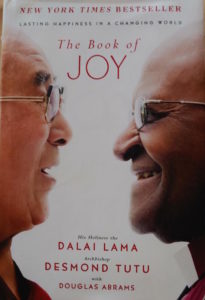The Archbishop had uses a beautiful phrase to describe this way of being in the world: “becoming an oasis of peace, a pool of serenity that ripples out to all of those around us.” (p. 274)
So do not worry about tomorrow, for tomorrow will bring worries of its own. Today’s trouble is enough for today. Do not judge, so that you may not be judged. For with the judgment you make you will be judged, and the measure you give will be the measure you get. (Matthew 6:34-7:1, NRSV)
The usual phrasing of scripture is to put the first two sentences with a previous grouping – consider the lilies of the field. The second begins a new chapter. But for today, I’m playing with the usual divisions – a bit of midrash in light of Bishop Tutu’s comment about generosity of spirit.
Easy to be with. Comfortable in her/his own skin. Grounded. Laughs easily and often. Life-giving. All different ways of touching on the same thing: a generous spirit. Not perfect, nor expecting perfection from others. Living the day that presents itself, not wishing for the day that didn’t. Aware of the unique gift each day is, but willing to let it go at day’s end – how else can a new day be embraced with all its beauty and holiness?
I’ve had the great good fortune to know several such people in my life. They have been my mentors, my friends, and my touchstones; they taught me to see in this life/this day/this moment a glimpse of God’s presence. In their words, actions, and presence, a transforming truth radiated:
If you can find God in the here and now, you have no reason to look elsewhere or elsewhen: if you can’t find God in the here and now, you won’t find God anywhere or anywhen else.
Thank you, Elisabeth Hewitt, Cullen Story, Horatio Chase, Grace and Albert Wood. You helped me see the life in my days.



